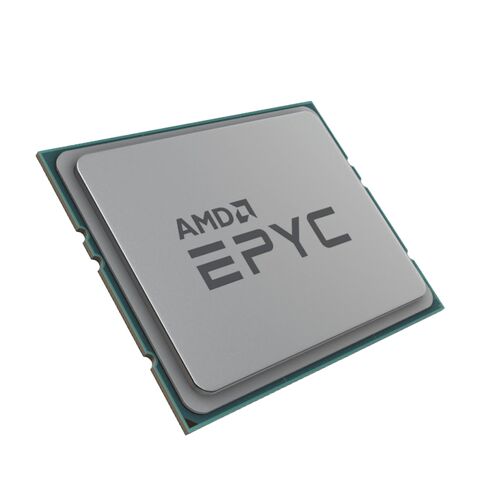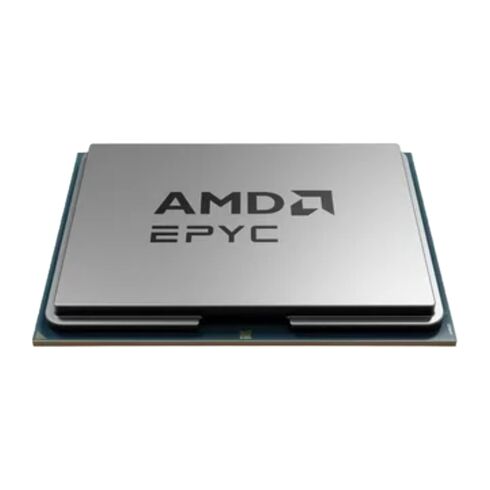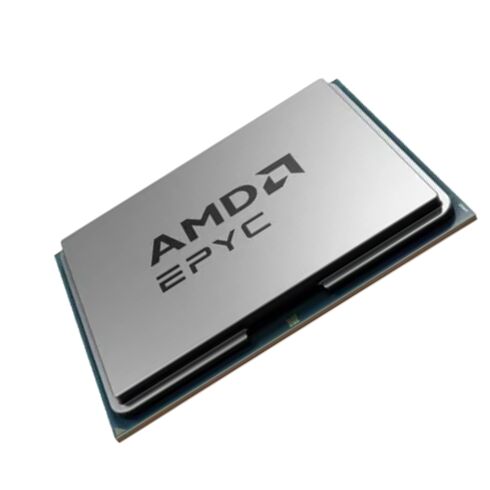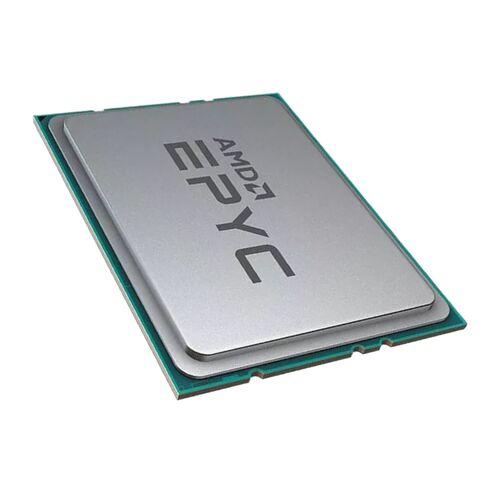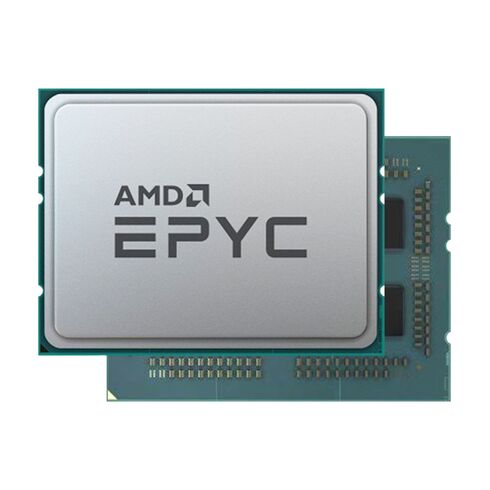100-000000048 AMD EPYC 7402P 24-Core 2.80GHz 128MB L3 Cache Socket SP3 Processor
- — Free Ground Shipping
- — Min. 6-month Replacement Warranty
- — Genuine/Authentic Products
- — Easy Return and Exchange
- — Different Payment Methods
- — Best Price
- — We Guarantee Price Matching
- — Tax-Exempt Facilities
- — 24/7 Live Chat, Phone Support
- — Visa, MasterCard, Discover, and Amex
- — JCB, Diners Club, UnionPay
- — PayPal, ACH/Bank Transfer (11% Off)
- — Apple Pay, Amazon Pay, Google Pay
- — Buy Now, Pay Later - Affirm, Afterpay
- — GOV/EDU/Institutions PO's Accepted
- — Invoices
- — Deliver Anywhere
- — Express Delivery in the USA and Worldwide
- — Ship to -APO -FPO
- — For USA - Free Ground Shipping
- — Worldwide - from $30
Overview of the Epyc 7402P Processor
The Epyc 7402P is a high-performance server processor manufactured by Advanced Micro Devices Inc. Designed for demanding workloads, this chip is engineered to provide exceptional speed and efficiency.
Key Specifications
- Processor Type: Server Processor
- Manufacturer: AMD
- Model Number: Epyc 7402P
- Part Number: 100-000000048
Technical Details
Core Features
This advanced processor features:
- Core Count: 24 cores
- Base Clock Speed: 2.8 GHz
- Maximum Boost Clock: Up to 3.35 GHz
Cache and Memory
The Epyc 7402P includes significant cache memory for enhanced processing capabilities:
- L3 Cache Size: 128 MB
Manufacturing Process
This processor is crafted using:
- Fabrication Technology: 7nm lithography
Thermal and Power Characteristics
Efficiency and thermal management are vital in server environments:
- Max Thermal Design Power (TDP): 180 W
- Compatible Processor Socket: SP3
Benefits of the Epyc 7402P Processor
Performance Advantages
Utilizing the Epyc 7402P can lead to improved performance in various applications, including:
- High-throughput computing
- Data analytics and processing
- Virtualization and cloud computing
Scalability and Efficiency
This processor is designed for scalability, allowing it to handle increasing workloads effectively:
- Optimized for multi-threaded tasks
- Supports a broad range of memory and I/O configurations
Energy Efficiency
The Epyc 7402P is built to deliver:
- High performance per watt
- Enhanced thermal management capabilities
Cores
The AMD EPYC 7402P Processor is equipped with 24 cores, making it a powerful choice for demanding workloads and applications. With each core capable of handling multiple tasks simultaneously, users can experience improved performance and efficiency.
Increased Processing Power
The 24 cores of the AMD EPYC 7402P Processor provide users with increased processing power. This means that tasks can be completed more quickly and efficiently, leading to improved productivity. Whether you are running complex simulations, virtualization workloads, or data analysis, the abundance of cores ensures that your tasks are executed swiftly and without any bottlenecks.
Parallel Computing
The large number of cores in the AMD EPYC 7402P Processor allows for parallel computing, which is the ability to execute multiple tasks simultaneously. This is particularly beneficial for applications that can be parallelized, such as rendering, scientific simulations, and machine learning. By dividing the workload among the cores, users can significantly reduce processing time and achieve faster results.
Multi-Threaded Performance
Each core in the AMD EPYC 7402P Processor supports simultaneous multi-threading (SMT), allowing for even greater performance gains. With SMT, each core can handle multiple threads, effectively doubling the number of available threads. This enables better utilization of system resources and ensures that tasks are executed efficiently.
Improved Responsiveness
The abundance of cores in the AMD EPYC 7402P Processor contributes to improved system responsiveness. With more cores available to handle various tasks, users can experience smoother multitasking and faster response times. Whether you are running multiple applications simultaneously or performing resource-intensive operations, the 24 cores ensure that your system remains responsive and lag-free.
Future-Proofing
The AMD EPYC 7402P Processor's 24 cores provide future-proofing for users. As software and applications continue to evolve, the demand for processing power increases. By investing in a processor with a high core count like the 7402P, users can ensure that their system can handle future workloads and remain competitive in the ever-changing technological landscape.
Base Clock
The base clock of the AMD EPYC 7402P Processor is set at 2.80GHz, providing a solid foundation for reliable performance. The base clock determines the minimum speed at which the processor operates, ensuring that even under heavy loads, it maintains a stable performance level.
Stable Performance
The 2.80GHz base clock of the AMD EPYC 7402P Processor ensures stable performance even during resource-intensive tasks. The processor operates at this minimum clock speed regardless of the workload, providing consistent and reliable performance. This is particularly important for applications that require a constant level of performance, such as servers or workstations running critical workloads.
Optimized Power Consumption
The base clock also plays a role in power consumption. By operating at a lower base clock when idle or under light loads, the AMD EPYC 7402P Processor can conserve energy and reduce power consumption. This is beneficial for users who are conscious of their energy usage or have systems that need to operate within specific power limits.
Turbo Boost Technology
While the base clock provides a solid foundation, the AMD EPYC 7402P Processor is also equipped with Turbo Boost technology. This technology allows the processor to dynamically increase its clock speed when higher performance is required. With Turbo Boost, the processor can reach frequencies beyond the base clock, ensuring optimal performance when needed.
Single-Threaded Performance
The base clock also impacts single-threaded performance. While applications that utilize multiple cores can benefit from high core counts, there are still plenty of applications that rely heavily on single-threaded performance. The 2.80GHz base clock of the AMD EPYC 7402P Processor ensures that even single-threaded tasks are executed efficiently, providing a smooth and responsive user experience.
Compatibility and Upgradability
The 2.80GHz base clock of the AMD EPYC 7402P Processor ensures compatibility with a wide range of applications and software. Most applications are designed to work within a specific performance range, and the 2.80GHz base clock falls within a commonly supported range. Additionally, the base clock provides room for future upgrades. As technology advances and faster processors become available, users can easily upgrade to higher-performing models without worrying about compatibility issues.
L3 Cache
The AMD EPYC 7402P Processor is equipped with a generous 128MB L3 cache, providing fast access to frequently used data and improving overall system performance.
Reduced Memory Latency
The large L3 cache of the AMD EPYC 7402P Processor helps reduce memory latency, which is the time it takes for the processor to retrieve data from the main memory. By storing frequently accessed data in the cache, the processor can access it much faster than if it had to retrieve it from the main memory. This results in improved performance and responsiveness, especially for data-intensive tasks or applications that rely heavily on memory access.
Enhanced Data Sharing
The L3 cache also facilitates data sharing among the processor cores. When multiple cores need access to the same data, having a large L3 cache ensures that the data is readily available, reducing the need for data transfers between cores and improving efficiency. This is particularly important in multi-threaded workloads, where efficient data sharing can significantly impact performance.
Improved Instruction Execution
The AMD EPYC 7402P Processor's L3 cache also plays a crucial role in instruction execution. Instructions are stored in memory and fetched by the processor for execution. With a large L3 cache, frequently used instructions can be stored closer to the processor cores, reducing the time it takes to fetch them. This results in faster instruction execution and improved overall performance.
Optimized Workload Handling
The 128MB L3 cache of the AMD EPYC 7402P Processor allows for optimized workload handling. Whether you are running multiple virtual machines, handling large datasets, or executing complex calculations, the ample cache size ensures that frequently accessed data and instructions are readily available to the processor cores. This translates to smoother operation and improved performance across a wide range of workloads.
Efficient Resource Utilization
With a large L3 cache, the AMD EPYC 7402P Processor can efficiently utilize system resources. By reducing the need to constantly fetch data from the main memory, the processor can allocate more time and resources to actual computation. This results in improved efficiency and better utilization of system resources, allowing users to maximize their computing power.
Socket
The AMD EPYC 7402P Processor features the SP3 socket, providing compatibility with a wide range of server and workstation motherboards. The SP3 socket offers several benefits and advantages for users seeking high-performance computing solutions.
Scalability and Expandability
The SP3 socket offers scalability and expandability, allowing users to build powerful computing systems that can handle demanding workloads. With the SP3 socket, users can choose from a variety of compatible motherboards and processors, enabling them to customize their system based on their specific requirements. Whether you need a single-socket or a multi-socket configuration, the SP3 socket provides the flexibility to scale your system as needed.
Server-Class Features
The SP3 socket is designed for server-class performance and features. It supports advanced features such as ECC (Error-Correcting Code) memory, which helps detect and correct memory errors to ensure data integrity. Additionally, the SP3 socket offers support for high-speed networking technologies, storage interfaces, and other server-specific features that are essential for running mission-critical applications and services.
Reliability and Stability
The SP3 socket is known for its reliability and stability. Designed for enterprise-grade applications, the SP3 socket ensures that your system remains stable even under heavy workloads or extended periods of operation. This reliability is crucial for businesses and organizations that rely on their computing systems to deliver consistent performance without interruptions or downtime.
Long-Term Support
AMD provides long-term support for the SP3 socket, ensuring compatibility with future processor generations. This means that users can invest in the AMD EPYC 7402P Processor knowing that they can easily upgrade to newer processors without having to change their motherboard or other system components. The long-term support offered by AMD adds value to the SP3 socket and provides peace of mind for users seeking a long-term computing solution.
Industry-Standard Compatibility
The SP3 socket follows industry-standard compatibility guidelines, ensuring compatibility with a wide range of components and peripherals. This makes it easier for users to find compatible memory, storage, and expansion cards, reducing compatibility issues and simplifying the building process. The industry-standard compatibility of the SP3 socket also means that users have access to a vast ecosystem of products and solutions, allowing them to optimize their system based on their specific requirements.


